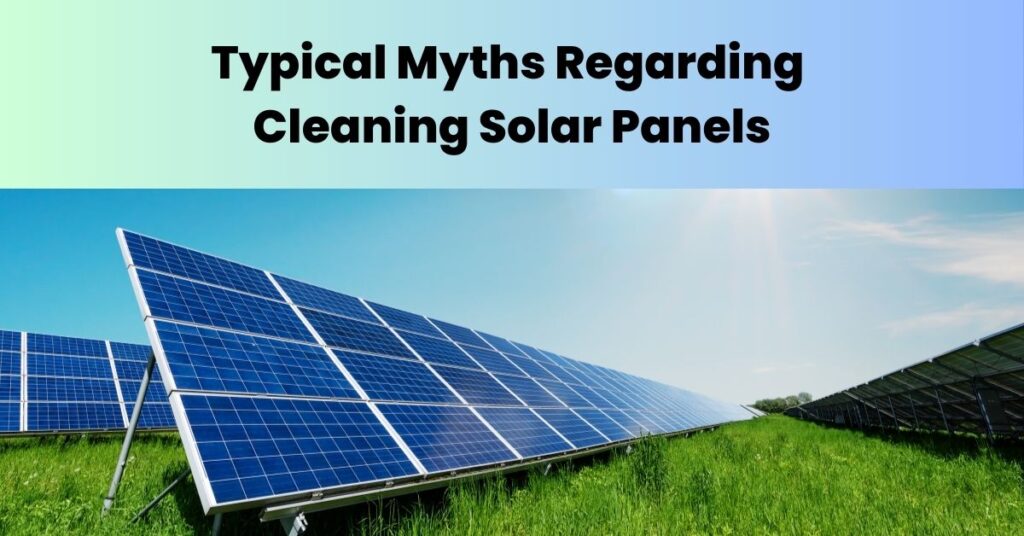You must be already aware of that solar panels lower electricity costs and save money if you have already installed them.
However, did you realize that maintaining their cleanliness is equally as crucial as installing them?
Pollen, dust, dirt, and even bird droppings all block sunlight and lower the amount of power your solar panels can produce. Your solar panels’ efficiency can be raised by at least 10% to 25% with routine cleaning.
At first, that might not seem like much, but over time, the savings can add up.

The Impact of Dirt on Solar Panels:
After a week without wiping your car’s windshield, consider it. Isn’t it more difficult to see through? This also applies to your solar panels.
When dirt accumulates, it can generate hotspots, which over time harm panels; it can also obstruct sunlight and decrease efficiency.
Therefore, a layer of dust can still reduce performance even if your solar panels appear “okay” from the ground.
What is a Cleaning System for Solar Panels?
Any technique or instrument used to clean your solar panels of dirt, dust, and grime is called a solar panel cleaning system.
A basic brush and hose or a fully automated robotic system can be used for this.
The location of your panels, the frequency of rain, the accessibility of your panels, and your time and financial constraints all affect the best system.
Different Kinds of Solar Panel Cleaning Equipment Systems by Hand:
These are the most popular and reasonably priced. You use a solar panel cleaning brush or a solar panel cleaning kit to clean the panels on your own. Typically, it comes with a long pole, brush head, water supply hookup, and occasionally a wiper.
Also Read: Rooftop Solar National Portal: Complete Handbook for Indian Homeowners 2025
Systems That Are Only Partly Automated
A motorized brush or sprayer is used in these systems. They perform the majority of the scrubbing for you, but you still have to manually control them. Excellent for installations of a moderate scale.
Completely Automated Mechanisms
Large commercial solar farms typically use these. These include track-mounted systems or robots that clean panels on a schedule without the need for human labor. These are expensive, but they work well over time.
Important Tools for Cleaning Solar Panels:
Let’s examine some of the frequently used instruments for solar panel cleaning in more detail.
Cleaning Brush for Solar Panels
This is a soft-bristle brush designed specifically for solar panels. It is harsh on dirt yet soft on glass. To safely reach panels from the ground, the majority include an extension pole.
Cleaning Brush with Wiper for Solar Panels
This tool is like a two-in-one. It features a rubber wiper on one side and a gentle brush on the other. You can remove any remaining streaks from the panel by wiping away the water after cleaning the dirt.
Cleaning Kit for Solar Panels
Below items are basically included in Solar Cleaning Kit: brush head, extension pole, hole connector, soap dispenser (optional), and microfiber cloth.
Everything you need to get cleaning right away is included in this kit.
Rooftop Solar Panel Cleaning
Safely cleaning solar panels on the roof might be risky. The following are some safety precautions:
• Avoid stepping on the panels directly. Perhaps you can crack them.
• Use a safety harness when working on a steep roof.
• Always clean in the early morning or late evening when the panels are cool.
Hot panels might crack when exposed to cold water.
• To prevent mineral stains, use soft water.
• When cleaning solar panels, use the right tools, such as a brush and wiper. Avoid harsh chemicals.
Don’t do it if it feels risky. Professionals can help with that.
When to Employ a Cleaning Service for Solar Panels
Sometimes, doing it yourself isn’t the greatest option. When your solar panels are difficult to access, it may be wise to hire a cleaning service.
• There are many panels in your collection.
• You lack the resources and time.
• You desire a streak-free, expert cleaning.
To keep panels pristine for longer, professionals frequently employ filtered water systems that leave no residue behind.
How Frequently Should Solar Panels Be Cleaned?
There isn’t a single, universal solution. However, the following general rules apply:
• For most households, twice a year is a smart place to start.
• Every three to four months if you reside in a dry or dusty area.
• Following the pollen season or residue from wildfires.
• If leaves or other debris cover the panels after a storm.
It could be time to clean them if you observe a decrease in solar energy output.
Do-it-yourself Solar Panel Cleaning Advice:
Do you want to do your own panel cleaning? This is a detailed guide.
Things You’ll Need:
• A cleaning kit for solar panels and a mild spray
• A sponge or soft brush
• A pail of warm water (do not use strong soap; this is optional)
Actions to take:
1. Switch off your solar panel. Prioritize safety.
2. Remove any loose leaves or debris using a brush.
3. To remove dirt, mist with water. Steer clear of excessive pressure.
4. Scrub gently with the brush side. Don’t scrape too hard.
5. Use the wiper side to clean. This keeps streaks at bay.
6. The panels can be gently wiped with a microfiber towel or allowed to air dry.
Additional Tips: On cloudy days or early in the morning, clean.
- Steer clear of abrasive pads and rough towels.
- Steer clear of the panels.
How Much Does Solar Panel Cleaning Cost?
One of the most frequently asked questions is cost. There are expenses associated with cleaning solar panels, whether you want to do it yourself or hire a professional.
Cost of Professional Cleaning:
• You should budget between $100 and $200 every visit for a small house with 10–20 panels.
• Some providers offer seasonal or annual packages at a discount if you sign up for regular cleanings. • Larger systems (30+ panels) may cost $250 to $400.
DIY Cost:
If you’re going to clean your own panels, here’s what you’ll spend:
• Cleaning brush for solar panels: $30–$60
• Pole, brush, and hose attachment included in the $50–$150 solar panel cleaning package; optional filtered water system: $100–$300
In the long run, doing it yourself is less expensive, but it does need more time and work, particularly if you’re cleaning your roof’s solar panels.
Environmental Issues with Cleaning Solar Panels:
Although solar panels are already very beneficial to the environment, you should also make sure that your cleaning practices are environmentally friendly.
Avert Dangerous Soaps:
Chemicals in many common household soaps and glass cleaners have the potential to:
• Damage your panels
• Leave residue behind
• Run off into your storm drains or may be landscape.
Use eco-safe cleansers designed especially for solar panels or just plain water instead. These are environmentally safe and biodegradable.
Water Use: Water waste is a frequent worry. Thankfully, solar panels don’t require pressure washing; a quick rinse generally suffices, and you can even utilize collected rainwater to save water.
Typical Myths Regarding Cleaning Solar Panels:

Confusion abounds, particularly on the internet. Let’s dispel a few of the most widespread misconceptions.
“I’ll have my panels cleaned by Rain.”
Rain does help a little. However, rain by itself won’t get rid of all the dirt, especially sticky things like pollen or bird droppings, like your car’s windshield. If you reside in an area with hard water, rain also leaves behind mineral patches.
“A pressure washer can be used.”
Definitely not. Water under high pressure can harm your panels’ surface and even loosen connections. Always use a solar panel cleaning brush and wiper or low pressure.
“The warranty is nullified when panels are cleaned.”
Not true. In actuality, several warranties need for routine upkeep. Just be careful not to use any harmful chemicals or instruments.
“Once a week, your panels should be cleaned.”
It’s excessive. Unless they reside in a location with a lot of dust, most homeowners only need to clean their panels two or four times a year.
Upkeep Advice to Maintain Clean Panels for a Longer Period
While cleaning is important, wouldn’t it be preferable if your panels maintained their cleanliness for a longer period of time?
Here are some easy maintenance behaviors to help:
Cut Down Trees Close by:
Trees that hang over your roof are more likely to produce leaves, sap, and bird droppings. Reduce shade and debris by keeping branches trimmed back.
Put up deterrents for birds:
Solar panels are a favorite perch for birds. To keep them away, you can erect mesh or innocuous spikes around the perimeter of your panels.
Right-angle the panels:
Rain will naturally remove much of the dirt if your panels are angled correctly. Flat panels require more frequent cleaning because they gather more dust.
Apply Protectants or Coatings:
Some businesses provide hydrophobic or anti-soil coatings to assist keep water and dirt away. These reduce how often you need to clean.
Is It Worth It to Use Automatic Cleaning?
Manual or somewhat automated cleaning systems are more than sufficient for the majority of homeowners. But in some cases, automated systems might make sense:
When It Makes Sense to Automate:
• You own a commercial solar array or solar farm
• Your system is in a desert or dry area with constant dust
• You want zero manual effort
• You need cleaning done at night or early morning
Automated methods clean the panels according to a timetable using robots or stationary sprayers on rails. Despite their high cost, they ultimately save a significant amount of labor.
Selecting the Appropriate Cleaning Kit for Solar Panels:
The extension pole’s length: Verify that the pole can safely ascend to your roof from the ground or a short ladder. Some poles have a maximum length of 20 feet.
Brush Quality: Select a brush with soft bristles to avoid scratching the panel’s surface. Steer clear of anything too harsh or rigid.
Wiper Function: You can scrape and squeegee water off of solar panels simultaneously using a solar panel cleaning brush that doubles as a wiper. This lessens water stains and streaks.
Water Supply Connection: It’s quite handy that certain kits allow you to connect a garden hose straight to the pole.
How to Determine If Panels Need to Be Cleaned:
Without solar monitoring software, how can you tell if your solar panels need to be cleaned?
Keep an eye out for these indicators:
•A discernible decrease in energy output
• Dust or filth on the panels
• Bird droppings, leaves, or pollen accumulation
• Months without rain
For optimum results, keep a monthly energy log so you can identify any changes early.
Is Winter a Good Time to Clean Panels?
Your location determines this. Snow will occasionally cover your panels if you live in a snowy area. However, if your panels are angled, snow usually melts and glides off quickly, so cleaning isn’t always required.
Winter may be the ideal season to clean if you live in a warmer climate because:
• Panels are colder
• Evaporation is reduced, which results in fewer streaks
• The extreme heat of the rooftop won’t be an issue for you.
Just use caution—cold weather can make wet roofs slick!
Conclusion:
Your solar panels are a huge investment, and like any investment, they need a little upkeep. Even if you decide to hire a cleaning service or may be do it yourself with a solar panel cleaning brush, cleaning must be an essential part of your solar maintenance routine.
Your panels will produce more energy, last longer, and ultimately save money if you keep them clean. Additionally, keep in mind that cleaning solar panels on the roof doesn’t have to be a major task. It may be easy, secure, and efficient with the correct solar panel cleaning kit.
Thus, the next time you glance at your roof, consider whether your solar panels are receiving enough sunlight.
Frequently Asked Questions FAQs:
- How should solar panels be cleaned?
Detailed instructions:
1. Turn off the solar panel system for safety.
2. Pour water and a light detergent into a bucket.
3. Use a long-handle soft-bristle brush to gently scrub the panel surface while standing on the ground.
4. Use a hose to rinse, using a low flow rate through the spray nozzle.
2. What kind of chemical is utilized to clean solar panels?
For cement dust and other heavy dust particles, use Tetra clean Solar Panel Cleaning Chemical Tspc1. Tetra Clean Solar Panel Cleaning Chemical is a simple and quick way to clean solar plates. It cleans your “Solar Plates” of dust, grime, and stains as well as foreign deposits caused by industrial flashover.
3. Do solar panels get washed by rain?
The best method for cleaning solar panels is, to a certain extent, rainwater. Debris and dust particles could, however, adhere to areas where sufficient rainwater contact has not been established.

